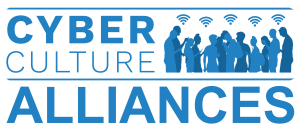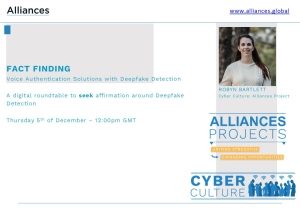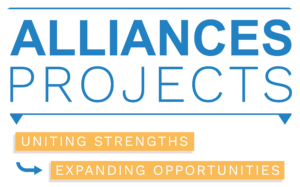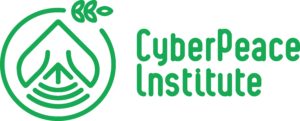WHY?
As the Alliances communities have access to a breadth of professionals who are up to speed on the reality of servicing and organisation with the upkeep of cyber culture as a cyber professional or as part of a service stack of cyber awareness and culture outsourced options for corporate.
This Alliances Project is a cyber culture initiative led by a working group of cyber experts who will aim to improve cybersecurity practices and increase their resilience in a number of ways.
Knowledge Sharing: Professionals with varying backgrounds and specialties can exchange experiences and knowledge in a working group. Individuals may not have come up with these creative ideas or insights on their own, but collective intelligence may.
Cross-disciplinary Collaboration: The field of cybersecurity is multidisciplinary and encompasses several domains, including technology, law, ethics, and psychology. Professionals from many disciplines can engage in a working group, promoting a complete and all-encompassing approach to cybersecurity concerns.
Skill enhancement: Collaborating in a group environment offers chances for people to improve their abilities. Professionals can share knowledge with one another, experience new technology, and have a greater comprehension of new risks and
Problem-solving: Cybersecurity issues are intricate and constantly changing. Diverse professional backgrounds can contribute unique viewpoints to problem-solving, increasing the likelihood of creating strong, long-lasting defences against cyberthreats.
Networking opportunities: Working together in a group setting offers networking opportunities that can result in beneficial professional relationships. These relationships may prove advantageous for future project collaboration, information exchange, and professional advancement.
Rapid response capability: A collaborating group with good connections can react to a cyber issue more quickly. The team can swiftly gather resources, exchange data, and plan actions to lessen the effects of an attack and make repairs.
Standardization and best practices: The creation of best practices and industry standards can be aided by a working group. Professionals can create guidelines and recommendations that can be broadly used to improve cybersecurity by combining their collective expertise.
Education and training: Additionally, the group might act as a venue for member education and training. Professionals are able to keep current on the newest cybersecurity tools, trends, and practices thanks to this environment of continuous learning.
Ethical considerations: By discussing and creating ethical standards, the working group promotes responsible and legal behaviour by ensuring that cybersecurity experts are aware of and follow ethical rules in their work.
Public awareness: The working group can support public awareness campaigns about cybersecurity challenges by working together on joint projects, which will inform the general public about the significance of online safety and responsible cyber behaviour.
The Cyber Culture project has been created to harness the expertise and knowledge of the community members that have dealt with or are currently dealing with from an online workforce or ambitiously, populations. We will be focusing on:
- Learning from each others successes & failures
- Understanding the risks
- Learning and sharing best practices within cybersecurity and outside of the siloed business division
- Understanding the skills required and demand for them
- How to improve organisational culture
- Technology service providers efficacy and comparison. Inclusive of multi-vendor challenges
- Development of frameworks and guides consolidating and applying to where is most relevant
- TTX consolidation and creation
These will be focused while also considering the context behind the verticals and geolocations of the conversations.





